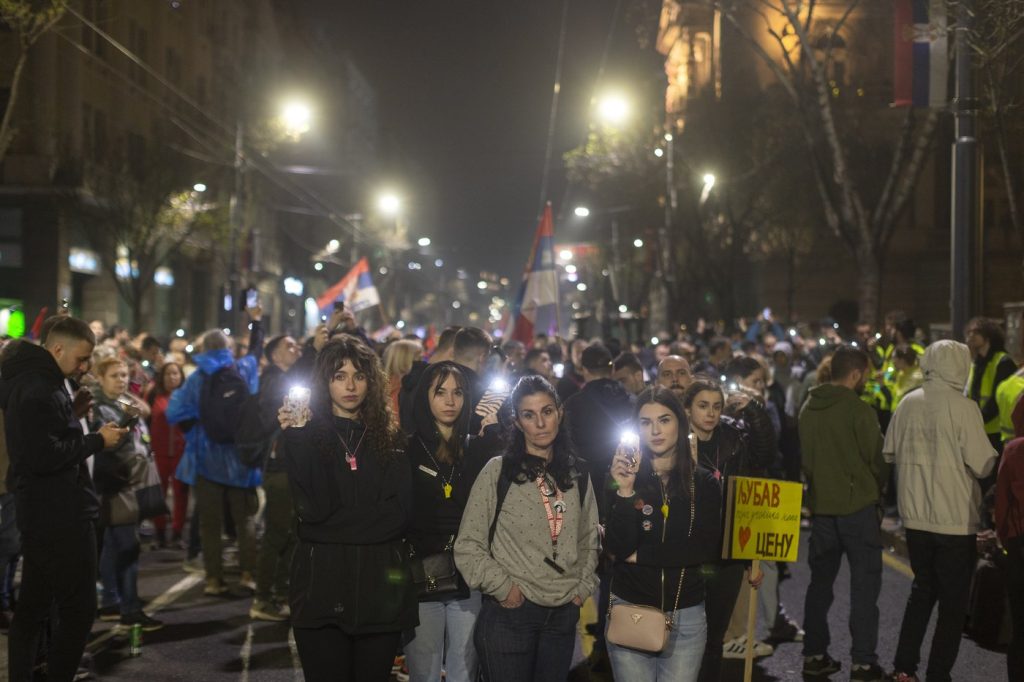BELGRADE, Serbia (AP) — On Monday, calls intensified in Serbia for an independent investigation into allegations that security forces used a prohibited sonic weapon against crowds during a peaceful anti-corruption rally last weekend. These claims have been vehemently denied by the Serbian authorities.
Serbian human rights groups and opposition officials allege that a device capable of emitting a targeted beam to temporarily incapacitate individuals was deployed during the protest on March 15, despite its ban in Serbia. The opposition plans to file charges with both international and domestic courts against those responsible for the alleged attack.
President Aleksandar Vucic, who is often described as authoritarian and pro-Russian, reiterated on Monday that the crowd-control device was not used, labeling the accusations a "wicked lie" designed to harm Serbia. He announced intentions to invite the U.S. Federal Bureau of Investigation (FBI) and Russia's Federal Security Service (FSB) to investigate the claims.
"It is important for history to see how they lied," Vucic stated, addressing the allegations of sonic weapon usage. While Serbian officials have indirectly conceded that the police acquired such a crowd control tool approximately two years ago, they maintain it was not utilized during the rally.
The opposition group Move-Change launched an online petition that has garnered over half a million signatures, calling on the United Nations, the Council of Europe, and the Organization for Security and Cooperation in Europe to conduct an independent investigation into the alleged use of a sound cannon against peaceful protesters in Belgrade. The petition demands that the inquiry examines the social, medical, legal, and technical implications of its effects on health and human rights.
Former Serbian President Boris Tadic echoed these concerns, stating that he "will ask for international help" to uncover the truth regarding the events that posed serious risks to public safety, impacting the health and lives of Serbian citizens during the protest.
During the rally, which attracted hundreds of thousands of participants in Serbia's capital, protesters gathered to commemorate the 15 individuals who tragically lost their lives in a railway station canopy collapse on November 1. Following this tragedy, near-daily demonstrations have unsettled Vucic's decade-long hold on power, with many citizens attributing the collapse to rampant government corruption.
Footage from the demonstration captured attendees observing a 15-minute silence in honor of the deceased when a sudden, piercing sound incited panic and caused a brief stampede. An Associated Press photographer on site reported that people rushed for cover, leaving the street nearly empty as attendees fell over one another in their haste.
Those believed to have been in the vicinity of the alleged sonic attack reported adverse effects such as sharp ear pain, disorientation, and panic. Security experts have indicated that prolonged exposure to sonic weaponry can lead to eardrum ruptures and irreversible hearing damage. Many individuals who claimed to be at the epicenter of the incident shared on social media their symptoms of intense headaches, nausea, and disorientation.
Some security experts have suggested that the U.S.-made Long Range Acoustic Device (LRAD)—a specialized instrument capable of projecting high-frequency sound waves over extensive distances—may have been utilized during the protest. However, these assertions remain unverified by independent sources.
Vucic has suggested that the protests organized by university students are part of a Western scheme to displace him from power and has threatened legal consequences for anyone disseminating what he deems misinformation.










